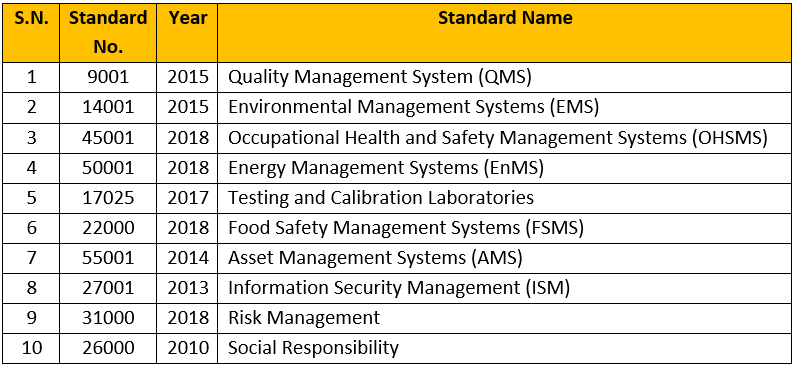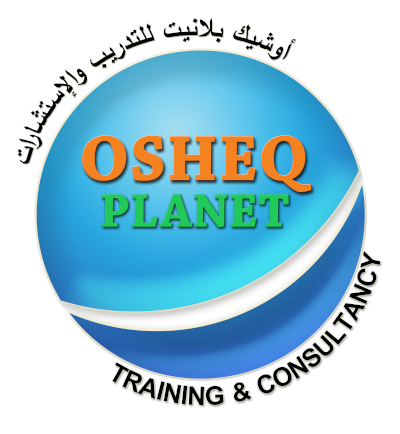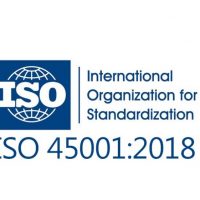International Organization for Standardization (ISO) is an international standard-setting body composed of representatives from various national standards organizations. Founded on 1947 with 165 member countries to develops and publishes worldwide technical, industrial and commercial standards, independent, non-governmental organization, and it published now more than twenty thousand standards. ISO Standards are a key part of our society as they ensure quality and safety in both products and services in international trade. Among the massive number of ISO standard, there ate top 10 that famous among the industries and trading bodies that we will debrief below.

Quality Management System (QMS) is the world’s most recognized standard, and can be used by any organization, large or small, regardless of its field of activity. In fact, there are over one million companies and organizations in over 170 countries certified to ISO 9001. It aims to help organization’s meet the needs of their customers and other stakeholders more effectively. This is achieved by building a framework to ensure consistent quality in the provision of goods and/or services.
Environmental Management System (EMS) helps organizations improve their environmental performance through more efficient use of resources and reduction of waste, gaining a competitive advantage and the trust of stakeholders. This ISO helps to: Demonstrate compliance with current and future statutory and regulatory requirements, Increase leadership involvement and engagement of employees, Improve company reputation and the confidence of stakeholders through strategic communication, Achieve strategic business aims by incorporating environmental issues into business management, Provide a competitive and financial advantage through improved efficiencies and reduced costs, and encourage better environmental performance of suppliers by integrating them into the organization’s business systems.
Occupational Health and Safety Management Systems (OHSMS) issued to protect employees and visitors from work-related accidents and diseases. It was developed to mitigate any factors that can cause employees and businesses irreparable harm. In addition, ISO 45001 was designed to take other existing occupational health and safety standards, such as OHSAS 18001, into account — as well as the ILO’s labor standards, conventions and safety guidelines.
Energy Management Systems (EnMS) is designed to support organizations in all sectors, and provides a practical way to improve energy use. Any organization need to be EnMS certified shall be: Develop a policy for more efficient use of energy, fix targets and objectives to meet the policy, use data to better understand and make decisions about energy use, measure the results, review how well the policy works, and, continually improve energy management.
Testing and Calibration Laboratories ISO standard specifies requirements for the competency of the entity to carry out tests and/or calibrations, including sampling. It covers testing and calibration performed using standard methods, non-standard methods and laboratory-developed methods. It ensures accredited laboratories are able to demonstrate that they are technically proficient and that the data produced is both accurate and precise. These requirements were developed from the ISO 9001 – with a specific focus on laboratory functions.
Food Safety Management System (FSMS) maps out what an organization needs to do to demonstrate its ability to control food safety hazards in order to ensure that food is safe. It can be used by any organization regardless of its size or position in the food chain from the farm to the table.
Asset Management Systems (AMS) help organizations manage the lifecycle of assets more effectively, will have better control over daily activities, achieve higher return with their assets, and reduce the total cost of risk. This ISO able to support your organizational growth by: managing assets effectively; mitigating and managing risk, and improving the financial performance of your organization.
Information Security Management (ISM) specifies the requirements for establishing, implementing, maintaining and continually improving an information security management system within the context of the organization. It also includes requirements for the assessment and treatment of information security risks tailored to the needs of the organization. This standard is generic and are intended to be applicable to all organizations, regardless of type, size or nature.
Risk Management Standard provides a level of reassurance in terms of economic resilience, professional reputation and environmental and safety outcomes. In a world of uncertainty, is tailor-made for any organization seeking clear guidance on risk management. Organizations using it can compare their risk management practices with an internationally recognized benchmark, providing sound principles for effective management and corporate governance.
Social Responsibility Standard provides guidance rather than requirements, so it’s unlike some other well-known ISO standards. Instead, it helps clarify what social responsibility is, helps businesses and organizations translate principles into effective actions and shares best practices relating to social responsibility, globally. It is aimed at all types of organizations regardless of their activity, size or location.
All in all, ISO certification drive your business to be more efficient, safe, sustainable, and secure whatever any standard that listed above. OSHAEQ planet provide consultation to be ISO certified and, in our website, (www.osheqplanet.com) we have one online course (ISO 45001), Register for FREE.


Thanks for the good article, I hope you continue to work as well.